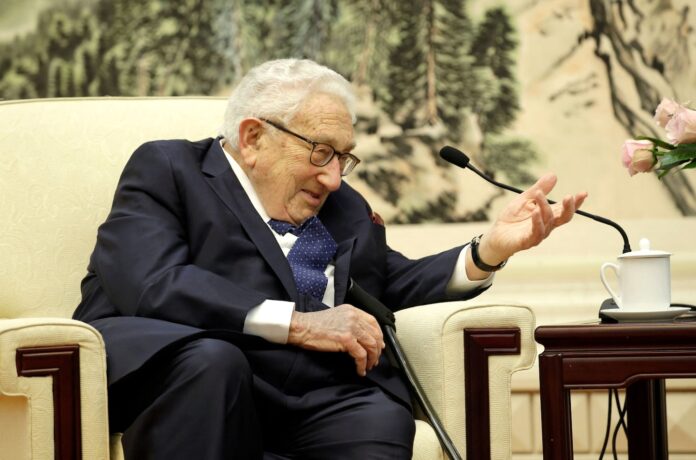The visit is remarkable not just because of Kissinger’s age and history with China, but also because it comes at a time of heightened tensions between the two countries. Military communications in particular are so fraught that Li refused to meet U.S. Defense Secretary Lloyd Austin at a regional security forum in Singapore last month.
During a visit to Beijing last month, Secretary of State Antony Blinken tried to get an agreement to resume direct military-to-military communications between the United States and China. But, Blinken said, Beijing rejected the idea despite dangerous recent near misses.
Yet in Beijing on Tuesday, Li told Kissinger that he hoped the United States will “work with China to implement the consensus reached by the leaders of the two countries and promote the healthy and stable development of relations between the two countries and their militaries,” Xinhua said.
Li has been under U.S. sanctions since 2018 over China’s purchase of combat aircraft and equipment from Russia’s main arms exporter.
Kissinger responded that both the United States and China should eliminate misunderstandings, Xinhua reported.
“History and practice have repeatedly proven that neither the US nor China can afford the cost of treating each other as opponents,” Kissinger said, according to the Chinese account. “If the two countries go to war, it will not bring any meaningful results to the people of the two countries.”
Kissinger’s visit coincides with that by another former American secretary of state: John F. Kerry, now the Biden administration’s climate envoy, is in Beijing for talks aimed at kick-starting cooperation between the world’s two biggest polluters.
The State Department was aware that Kissinger was traveling to China, spokesman Matthew Miller told reporters in Washington Tuesday.
“It actually came up in the meetings that Secretary Blinken had when we were in China,” Miller said. “The Chinese officials mentioned that he was planning to come, as he has done a number of times over the years as a private citizen. I will say he was there under his own volition, not acting on behalf of the United States Government.”
Kissinger has had close ties with Chinese officials since he secretly visited Beijing in 1971 to lay the groundwork for President Richard M. Nixon’s historic trip the following year, which led to rapprochement with China. The two countries forged official diplomatic relations in 1979.
Kissinger remains revered in China for those efforts.
“Kissinger has made great contributions to China-US relations, which can be seen as one of his career highlights, under the principle of putting aside ideological differences and handling China relations based on reality and respect with an emphasis on equality,” Li Haidong, a professor at the China Foreign Affairs University, told the state-affiliated Global Times newspaper on the occasion of Kissinger’s 100th birthday.



